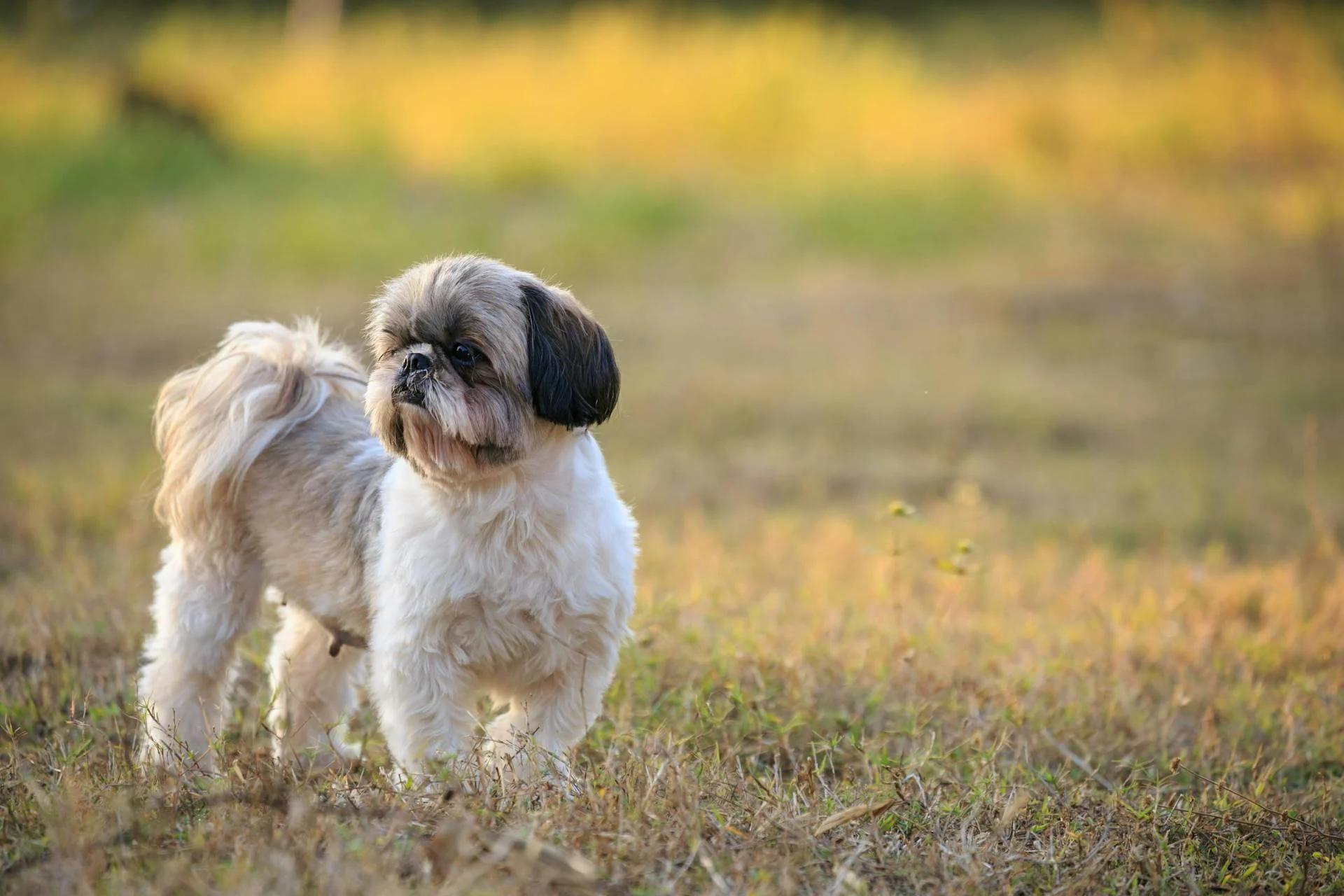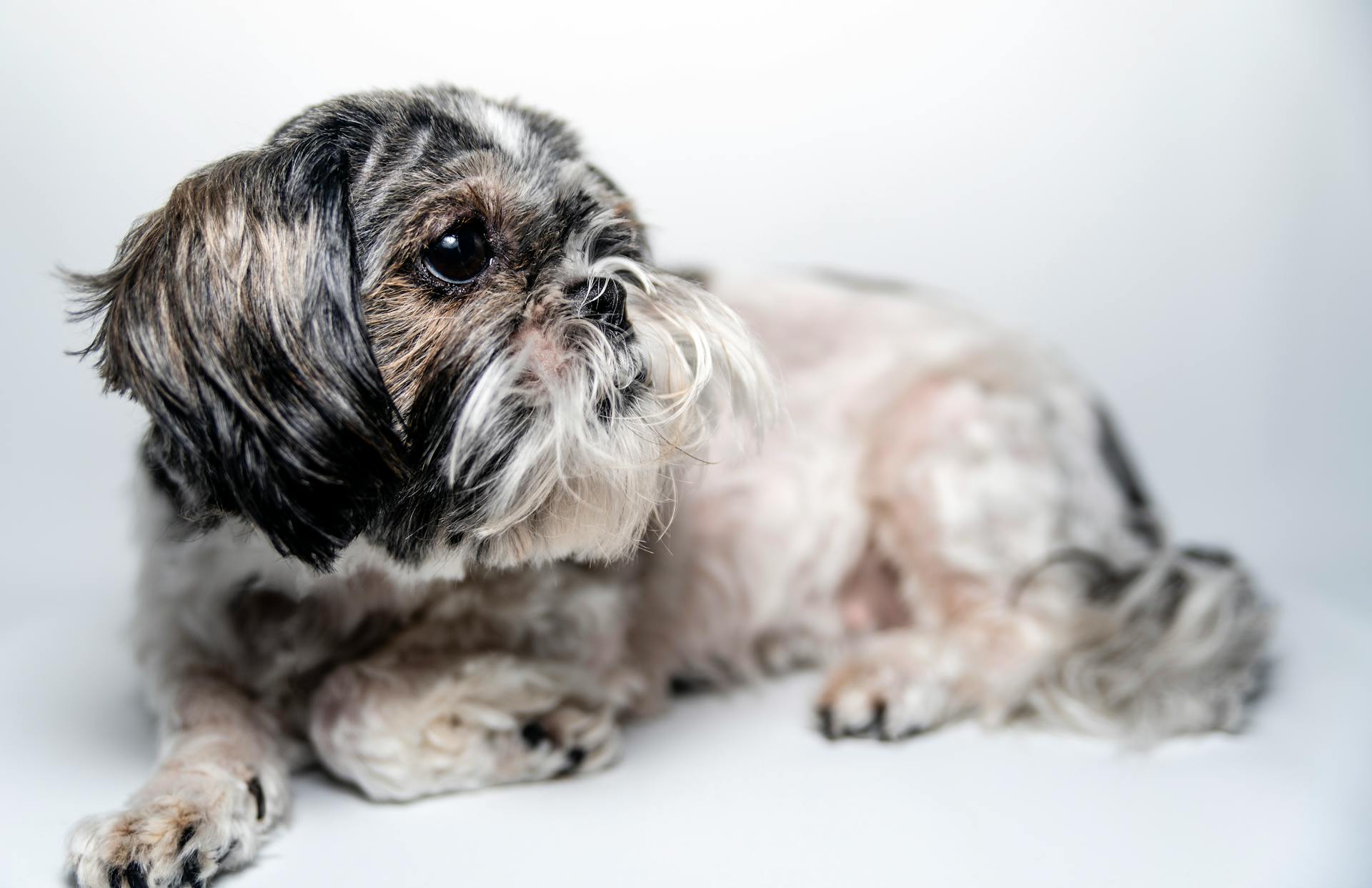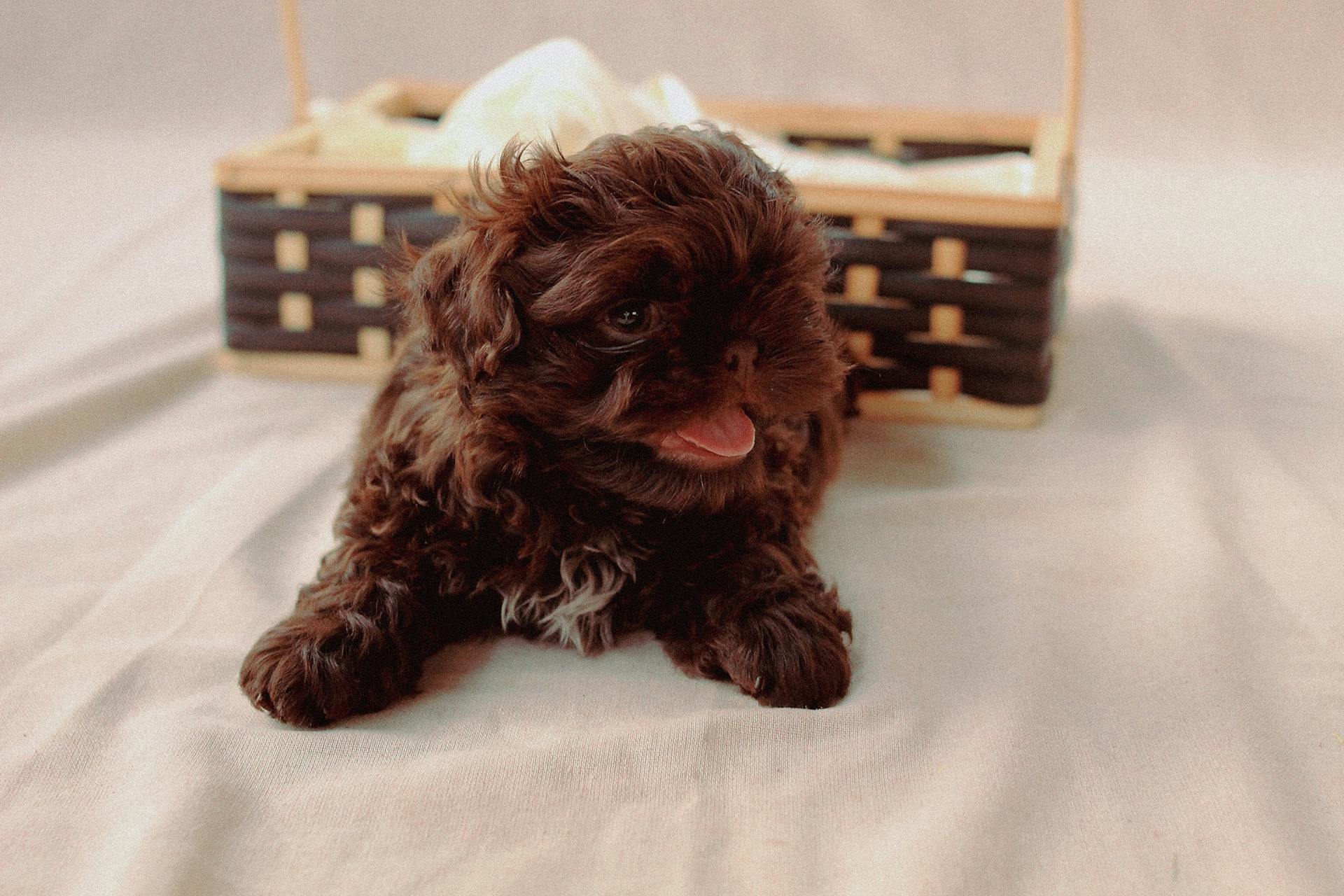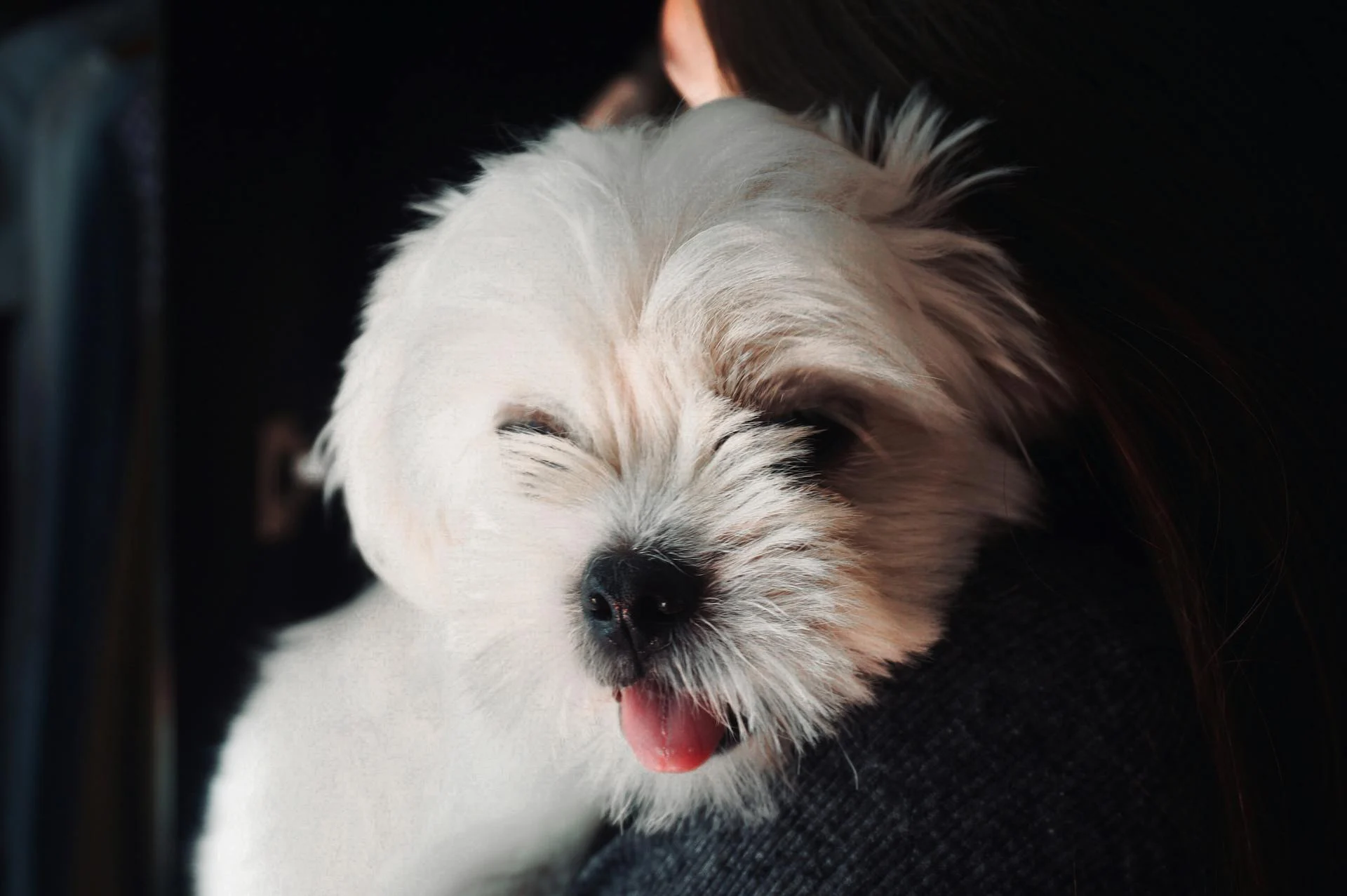
If your Shih Tzu is hiccuping, it's essential to understand the underlying causes, as they can be a sign of a more serious issue.
Hiccups in Shih Tzus can be caused by eating too quickly or drinking too much water.
A Shih Tzu's small stomach and prone-to-eating-too-fast eating habits make them more susceptible to hiccups.
What Causes Hiccups in Shih Tzus?
Hiccups in Shih Tzus can be caused by eating too quickly, which can lead to swallowing air and putting pressure on the diaphragm.
Eating too quickly can also lead to gobbling food, which is a common trait in Shih Tzus. Their small jaw size and tendency to inhale food can cause them to swallow air, triggering hiccups.
Air swallowing is a common issue in Shih Tzus because of their brachycephalic skull structure, which can make it difficult for them to breathe properly.
Shih Tzus are also prone to hiccups due to excitement or stress, which can put pressure on the diaphragm and cause spasms.
In some cases, hiccups in Shih Tzus can be a sign of an underlying health issue, such as gastrointestinal problems or respiratory infections.
How to Get Rid of Hiccups in Shih Tzus
If your Shih Tzu has hiccups, don't try to scare them or pull their tongue - it'll only irritate them more.
You can try giving your Shih Tzu a gentle "spook" from around the corner, but be very careful not to instill legitimate fear in your poor pup.
A sip of water might help, just make sure they drink it slowly to avoid gulping down air and ending up with another bout of hiccups.
Offering something sweet, like water mixed with a little bit of sugar, might help distract them and relax their breathing pattern.
You can also try massaging your Shih Tzu's chest to help relax the diaphragm and get their breathing back to a normal rhythm.
Light exercise, like a mellow walk, may also do the trick by changing your pet's breathing patterns.
To prevent Shih Tzu hiccups, consider getting them a slow dog feeder if they gobble up their food quickly.
You should also consider the size of their water bowl - there are bowls with different heights or levels that can help the water go down slower and with less air intake.
Here are some tips to help your Shih Tzu get rid of hiccups:
- Distract your Shih Tzu with play or a treat to shift their focus and change their breathing pattern.
- Massage their chest to relax the diaphragm muscle and alleviate hiccups.
- Encourage slow drinking by offering small amounts of water.
- Control excitement, as over-excitement can trigger hiccups in Shih Tzus.
Remember, hiccups in Shih Tzus are usually not a cause for concern and will resolve on their own.
When to Be Concerned About Your Shih Tzu's Health
If your Shih Tzu's hiccups occur very often, last for longer than a couple of hours at a time, or begin to interfere with their daily activities, it's time to get in touch with your veterinarian.
Hiccups that are accompanied by other symptoms such as coughing, sneezing, discharge from the nose, or wheezing can be a sign of respiratory issues like asthma, bronchitis, or pneumonia.
If your Shih Tzu is experiencing diarrhea, vomiting, and bloody stools on top of prolonged hiccups, it might be an indication of a gastrointestinal (GI) problem.
If your Shih Tzu's hiccups last for more than 24 hours straight, or if they are recurrent, labored breathing, or accompanied by signs of distress, it's essential to contact your vet.
Here are some potentially serious causes of dog hiccups:
- Respiratory issues
- Heatstroke
- Pericarditis (inflammation of the heart sac)
- Hypothermia
- Gastric issues
- Parasitic infections
Your vet will likely start with a physical exam, bloodwork, and urinalysis to determine the underlying cause of the abnormal hiccups.
Preventing and Managing Hiccups in Shih Tzus
To prevent hiccups in your Shih Tzu, regulate mealtime by using slow-feeder bowls to help them eat at a steady pace. This can prevent gulping down food too quickly, which can contribute to hiccups.
Maintaining a calm environment is also crucial, as stress and excitement can trigger hiccups in Shih Tzus. Provide a quiet, comfortable space for your Shih Tzu to rest and relax.
Offering smaller, more frequent meals can also help reduce the likelihood of hiccups in your Shih Tzu. This can be especially helpful if your Shih Tzu tends to gobble their food quickly.
Preventing Issues

To prevent issues with hiccups in your Shih Tzu, regulate mealtime by using slow-feeder bowls to help your puppy eat and drink at a steady pace.
A calm environment is crucial, so minimize stress and excitement, and provide a quiet, comfortable space for your puppy to rest and relax.
Avoid sudden temperature changes, as extreme fluctuations can cause hiccups in puppies.
Offering smaller, more frequent meals throughout the day can help reduce the likelihood of hiccups.
Stress and excitement can also cause hiccups in dogs, so it's essential to keep your Shih Tzu calm and relaxed.
Encourage your Shih Tzu to drink water calmly and slowly, whether it's from a dog water fountain or a dog bowl.
A different take: A Shih Tzu Puppy
Other Remedies
Some Shih Tzus may find relief from hiccups by drinking water quickly, a remedy that can help to stimulate the vagus nerve and stop the hiccup spasms.
Drinking water from a glass with a narrow neck can be especially helpful, as this can cause the dog to swallow more air and potentially trigger the hiccup reflex.
Gently massaging the diaphragm area, located just below the ribcage, can also be a soothing remedy for hiccups in Shih Tzus.
Using a warm compress on the diaphragm area can be a calming and comforting way to help soothe hiccups in Shih Tzus.
In some cases, hiccups may be a sign of a more serious underlying issue, such as gastrointestinal problems or a respiratory infection, so it's always a good idea to consult with a veterinarian if hiccups persist.
Understanding Hiccups in Shih Tzus
Shih Tzus, with their adorable faces and playful personalities, can be prone to hiccups just like any other puppy breed. Puppies are more likely to get hiccups because their bodies are still growing, and their diaphragm muscles may be more sensitive.
Their diaphragm muscles play a vital role in breathing, and when they spasm, it creates that familiar "hic" sound. Eating or drinking too quickly can trigger these spasms, so it's essential to monitor their eating habits.
Excitement or stress can also lead to hiccups, as can sudden shifts in temperature. If your Shih Tzu is experiencing hiccups, it's likely due to one of these everyday activities.
Most of the time, hiccups are harmless and will go away on their own. However, if your Shih Tzu's hiccups last more than a day or come with signs like coughing, trouble breathing, or unusual tiredness, it's a good idea to consult your veterinarian.
As Shih Tzus grow and mature, their diaphragm muscles develop, and the frequency of hiccups should decrease. Most puppies will experience a significant reduction in hiccups by the time they reach adulthood, around 12-18 months of age.
Occasional hiccups are a normal part of a puppy's development, and it's not uncommon for Shih Tzus to experience them. In fact, it's quite common for puppies to get hiccups, especially during their rapid growth phase.
Frequently Asked Questions
What can be mistaken for hiccups in dogs?
Dogs experiencing reverse sneezing or continuous coughing may exhibit symptoms similar to hiccups, indicating a potential health issue that requires veterinary attention
Featured Images: pexels.com

